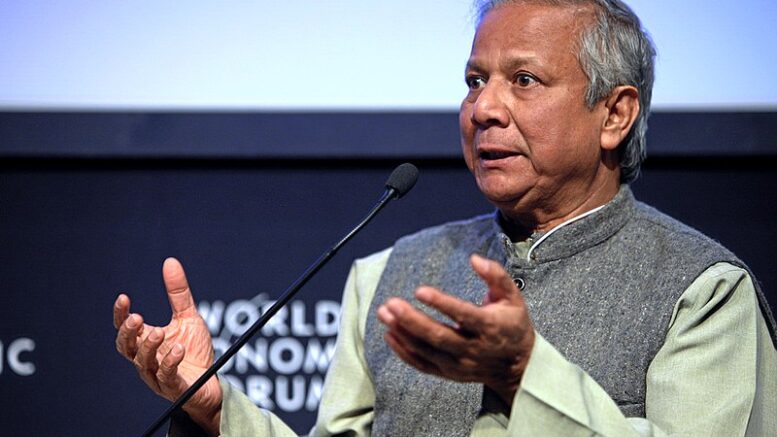An interview with Mohammad Yunus
Interview by Marco Werman
We wanted to learn more about why, despite early optimism, microfinance, these micro-loans, failed to lift so many people out of poverty in places like Cambodia. So we reached out to Mohammad Yunus. He’s an economist from Bangladesh. Yunus received the Nobel Peace Prize in 2006 for his work founding the Grameen Bank and pioneering the concepts of microcredit and microfinance.
Professor Yunus, microfinance has left many vulnerable people deeper in debt, accumulating more debt to pay off past debt. That’s the case in Cambodia and several other countries. When it comes to this basic concept of small loans for low income people, what do you think went wrong?
It went wrong because many loan sharking practices are also called microcredit. So anything under the sun is called microcredit. So you mentioned some of the programs which went wrong, but there are many programs which are successfully done around the world.
Microcredit in Bangladesh is a household thing for every family in Bangladesh and the poor families. We do it in the United States, Grameen America, which reaches out to nearly 200,000 women, doing it for fourteen years, lend out over a billion dollars a year now. But it works nearly over 99 percent, and never a prepayment rate over the last fourteen years, despite Covid-19 and everything else.
Well clearly, it is the case that legit microcredit programs have been overtaken, in cases, by commercial banks, that nongovernmental organizations had once run. How big of a surprise was that to you?
We were very worried about it. They have taken microfinance to make money for themselves. So their intention is to profit maximization, not helping people. Genuine microcredit is a social business. It’s a business to help people, rather than to make personal profit out of it. So it’s a nondividend business, it’s a self-sustaining business, but no owners take any dividend out of it. So when the conventional banks pick it up, obviously they want to make profit. So it’s the wrong path.
What is the essential difference between how a true microfinance program works, and how a bank operates?
Conventional banks go to the rich, I go to the poor. Conventional banks go to the city center, I go to the remote village. Conventional banks go to the men, I go to women. Conventional banks want collateral, I said forget about collateral. Conventional banks want lawyers to come into the evidence section, I said forget about the lawyers.
So in turn, microfinance is lawyer free banking. In turn, microfinance is collateral free banking. In turn, microfinance is saying you have the ability to become an entrepreneur. Here is the money. You start whatever business you want to do.
And what is different about the terms of the loans at the center of the two approaches you just described?
Every loan microcredit gives has to be an income generating loan. A conventional bank gives you money to buy a refrigerator. That’s not income generating, so you get into debt. You want to buy the shoes which you can not afford, because it does not give you an income. So that is the most distinguishing feature that exists. You are an entrepreneur, it is all business loans. It is not consumption loans.
In hindsight, I guess we could have predicted the rise of loan sharks stepping in like wolves in sheep’s clothing, and bringing more debt on low income people. What would you say you got right, Mohammad Yunus, decades ago about how to end poverty, and what do you wish you had gotten right?
Poverty is not created by poor people. Poverty is created by the system that we built.
So no matter how much you put your efforts to solve poverty within the system, you go back to the same old problem of poverty, the system creating poverty.
Our economic machine is a sort of sucking machine. It sucks up wealth from the bottom and sends it to the top. The top few people have all the wealth of the world. So the people at the bottom remain where they are or slightly improve a little bit, but If you want to create a world free from poverty, you have to redesign the system. Where it will not pump out all the wealth to the top, it will bring the wealth from the top to the bottom. We need to redesign the financial system, whether you are from a poor family, whether you are from a middle income family doesn’t matter. You are as capable an entrepreneur as anybody else.
One last thing Mohammad Yunus, in the 1970s you argued that credit is a human right, decades later has the world made any progress on that front? I mean you believe it, but what about the rest of the world?
This present system has created us into money making monsters. We are money making robots. We can not see anything other than the money. We speak money, we think money, we sell money. We forgot that there are human beings on this planet, there’s the environment of this planet. We destroy everything, just to make money. We have to get out of this, otherwise we will destroy ourselves very soon.
Marco Werman is the host of Public Radio International’s The World.
Mohammad Yunus is an award-winning economist from Bangaldesh, and Director of the Grameen Bank.
Source: theworld.org, October 18, 2023

